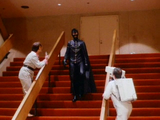| View previous topic :: View next topic |
| Konglish is... |
| speaking English with a thick accent. |
|
2% |
[ 1 ] |
| using English words in a Korean sentence |
|
13% |
[ 5 ] |
| speaking English with Korean grammar and syntax rules |
|
25% |
[ 9 ] |
| speaking English with borrowed words (like skin+ship) that have no meaning in English |
|
36% |
[ 13 ] |
| something else. |
|
22% |
[ 8 ] |
|
| Total Votes : 36 |
|
| Author |
Message |
Ya-ta Boy
Joined: 16 Jan 2003
Location: Established in 1994
|
 Posted: Tue Apr 12, 2005 5:23 pm Post subject: Voting on Konglish Posted: Tue Apr 12, 2005 5:23 pm Post subject: Voting on Konglish |
 |
|
| There seems to be divergent opinions of what the term 'Konglish' means. So let's have a poll. (Truth by majority rule isn't such a bad idea, is it?) |
|
| Back to top |
|
 |
Ya-ta Boy
Joined: 16 Jan 2003
Location: Established in 1994
|
 Posted: Tue Apr 12, 2005 5:31 pm Post subject: Posted: Tue Apr 12, 2005 5:31 pm Post subject: |
 |
|
I voted for the third option because to me, Konglish is when someone charges into their sentence and forgets the verb until the very end...leaving out articles left and right; always use a singular verb because they used a singular subject even when not appropriate...; and using words they found in the dictionary (Let's be intimate friends, OK?)
That kind of thing.
In my opinion, Konglish is a natural phase a language learner goes through when learning English. It's just the opposite of Engrean. |
|
| Back to top |
|
 |
steroidmaximus

Joined: 27 Jan 2003
Location: GangWon-Do
|
 Posted: Tue Apr 12, 2005 6:06 pm Post subject: Posted: Tue Apr 12, 2005 6:06 pm Post subject: |
 |
|
I choose the 4th: using English in a way to describe something particular to Korea. For example: "booking" to refer to a club where men and women go to meet.
But it also means #3. Both are applicable. Also using Korean pronunciation, such as 'orangee'. |
|
| Back to top |
|
 |
ladyandthetramp

Joined: 21 Nov 2003
|
 Posted: Tue Apr 12, 2005 9:43 pm Post subject: Posted: Tue Apr 12, 2005 9:43 pm Post subject: |
 |
|
Why limit it to Koreans using English when speaking or making mistakes when speaking English?
What about us foreigners who make mistakes when speaking Korean or try using English words when speaking Korean?
I'd say it can include all of the above. For example, franglais is used for both native English speakers and native French speakers speaking the other language. |
|
| Back to top |
|
 |
eamo

Joined: 08 Mar 2003
Location: Shepherd's Bush, 1964.
|
 Posted: Tue Apr 12, 2005 10:09 pm Post subject: Posted: Tue Apr 12, 2005 10:09 pm Post subject: |
 |
|
| I think the second mostly but the others as well to a degree. Konglish does not have to be mangled English. A Korean will use the phrase "game CD" in a Korean sentence. That's decent English. We have Audio CD's, Video CD's and Game cd's. To me Konglish is borrowing English and using it in Korean rightly or wrongly. |
|
| Back to top |
|
 |
SuperHero

Joined: 10 Dec 2003
Location: Superhero Hideout
|
 Posted: Tue Apr 12, 2005 10:26 pm Post subject: Posted: Tue Apr 12, 2005 10:26 pm Post subject: |
 |
|
The way I define Konglish to my students is and I quote from my handout:
| Quote: |
What is Konglish? Konglish is when Koreans speak English but use Korean words that they think are English but really are not. (1)This often happens when an English word is used in Korean but the meaning changes to something different from the original.
Another possibility is when (2)English words are combined in Korean to make new phrases that do not exist in English. additionally, (3)brand names are sometimes used as nouns. (4)Finally sometimes words are contracted (shortened)
Example:
(1) cunning: In English this means sly, smart, or devious in konglish it means—Cheating
(2) back mirror: this should be rear view mirror
(3) Yoplait: this should be yogurt
(4) air con: this should be air conditioner
You can see a useful list of konglish words at
http://konglish.org/konglish-words/
|
I also support the term Konglish being used to define mangled Korean by foreigners learning the language as well. |
|
| Back to top |
|
 |
Saxiif

Joined: 15 May 2003
Location: Seongnam
|
 Posted: Tue Apr 12, 2005 11:27 pm Post subject: Posted: Tue Apr 12, 2005 11:27 pm Post subject: |
 |
|
| Quote: |
| What about us foreigners who make mistakes when speaking Korean or try using English words when speaking Korean? |
Nothing wrong with that. My Korean's crap and my fiance's brother's English is equally crappy but since we've spent a good deal of time together we've cobbled together an English/Korean pidgin that works surprisingly-well.
But specifically, I'd call the use of English-derived words and terms in a manner that is not standard English useage but are widely used in Korea. For example, booking, eye shopping, glamour, apart, remote con etc. etc. |
|
| Back to top |
|
 |
schwa
Joined: 18 Jan 2003
Location: Yap
|
 Posted: Wed Apr 13, 2005 1:03 am Post subject: Posted: Wed Apr 13, 2005 1:03 am Post subject: |
 |
|
| SuperHero wrote: |
(1) cunning: In English this means sly, smart, or devious in konglish it means—Cheating
(2) back mirror: this should be rear view mirror
(3) Yoplait: this should be yogurt
(4) air con: this should be air conditioner
You can see a useful list of konglish words at
http://konglish.org/konglish-words/
|
"Cunning" isnt exactly cheating -- more precisely, it means spying on someone else's work. I think the derivation might be "conning" which means memorizing or studying closely, or even the conning tower of a submarine. Not so far off the mark.
I like simplified reformulations like "back mirror." "Sharp" seems so much more sensible than "mechanical pencil," etc. So long as the meaning holds, these could be candidates to become standard english. Unlike "handle" for "steering wheel" -- thats just confusing.
"Yoplait" -- you never refer to a kleenex or a bandaid? Most Koreans say yogurt anyway (well, yo-guh-luh-tuh).
"Air con" in my experience is used everywhere by english speakers of all stripes.
In fact a lot of words that get trotted out as examples of konglish have currency in other countries. "Ballpen" for example is prevalent throughout Asia.
A lot of so-called konglish originated with Japanese appropriation of english. Where do you draw the line? "Tambae" for cigarette here, for example, derives from "tom-ba-go," the Japanese take on "tobacco" -- does that make it konglish? |
|
| Back to top |
|
 |
peemil

Joined: 09 Feb 2003
Location: Koowoompa
|
 Posted: Wed Apr 13, 2005 2:37 am Post subject: Posted: Wed Apr 13, 2005 2:37 am Post subject: |
 |
|
| Where is "Completely and utterly incomprehensible?" |
|
| Back to top |
|
 |
No L
Joined: 17 May 2004
|
 Posted: Thu Apr 14, 2005 7:11 pm Post subject: Posted: Thu Apr 14, 2005 7:11 pm Post subject: |
 |
|
| Quote: |
| A lot of so-called konglish originated with Japanese appropriation of english. Where do you draw the line? "Tambae" for cigarette here, for example, derives from "tom-ba-go," the Japanese take on "tobacco" -- does that make it konglish? |
It is difficult to draw the line, but I think there is a difference between Konglish and "borrowed words". The example of the "Japanese take" on tobacco would be a borrowed word. It is now a valid word in Japanese. "Cunning" may have become an accepted word in Korean, but it's not in English (using the Korean definition, that is). To me, using it in English with its Korean definition would be Konglish.
Borrowed words don't usually change the definition. English has tons of examples. German words: clown, dollar, strudel, snorkel. French words: etiquette, faux pas, mayonnaise Yiddish words: bagel, glitch |
|
| Back to top |
|
 |
kangnamdragon

Joined: 17 Jan 2003
Location: Kangnam, Seoul, Korea
|
 Posted: Thu Apr 14, 2005 7:38 pm Post subject: Re: Voting on Konglish Posted: Thu Apr 14, 2005 7:38 pm Post subject: Re: Voting on Konglish |
 |
|
| Ya-ta Boy wrote: |
| (Truth by majority rule isn't such a bad idea, is it?) |
Actually, it can be. If everyone votes that 2+2=5, does that make it true? |
|
| Back to top |
|
 |
thorin

Joined: 14 Apr 2003
|
 Posted: Thu Apr 14, 2005 8:51 pm Post subject: Posted: Thu Apr 14, 2005 8:51 pm Post subject: |
 |
|
| SuperHero wrote: |
I also support the term Konglish being used to define mangled Korean by foreigners learning the language as well. |
I call that Anglo mal. |
|
| Back to top |
|
 |
|

